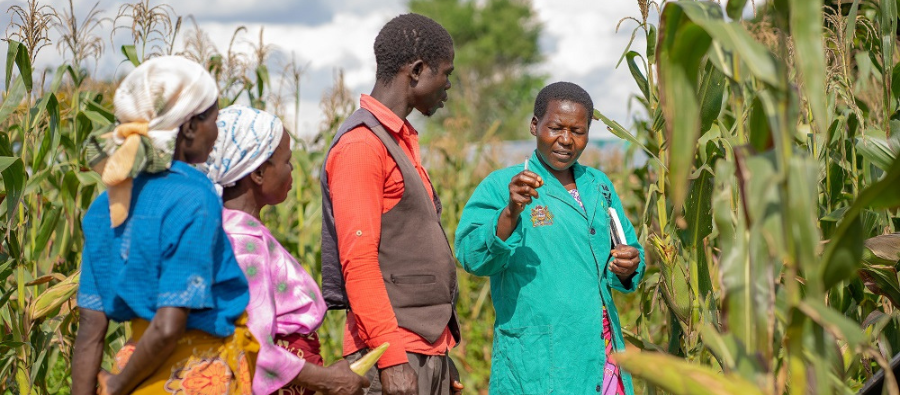Dr Dennis Rangi, Director General, Development at CABI, discusses the potential for Africa’s youth in agriculture.
An African agricultural revolution can not only help advance the continent’s development progress, but it can also solve the growing challenge of youth unemployment, especially in rural areas.
Africa’s youth hold the key to the continent’s very survival and the burden to sustain wider global development. But we simply cannot rely upon young people to be only producers of food. Through upskilling and a digital ‘knowledge exchange’, they must also be involved across all stages of the value chain – starting from production.
By 2050, Africa’s population is expected to double to around 2.6 billion. This creates greater pressure to feed many mouths amid the challenges of economic, political and societal instability, let alone the impacts of climate change.
In 2019, almost 60% of Africa’s population was under the age of 25. Africa is the world’s youngest continent, but just 56% of the population is of working age. This translates to about 1.3 people of working age supporting every dependant (mostly youth) – compared to a global average of two workers to every dependant. This in essence is the ‘youth bulge’, and addressing it is more urgent than ever.
Africa’s youth and the agribusiness revolution
The time is ripe for Africa’s youth to lead the way in digital agriculture.
Agriculture has long been the dominant sector in much of Africa in terms of output, employment and export earnings. In fact, agriculture is arguably the most important business opportunity for the continent’s young people to embrace.
This is especially true when thinking of young people’s roles in agricultural value chains. We need to take a ‘two-pronged’ approach to enhancing their skills not only in producing safer foods free from crop pests and diseases but also in involving them as village-based advisors. They could also combine these roles to tackle the ever-increasing food crisis.
A ‘revolution’ in agribusiness involving Africa’s youth is required to capitalise on the sector’s contribution to around 25% of the continent’s Gross Domestic Product (GDP) and 70% of its employment. With support, young people need to meet these challenges head-on so they can leave a lasting and sustainable legacy for generations to come.
Leveraging youth as ‘digital natives’
In Kenya, digital innovations have eased trading barriers across certain value chains by providing trade platforms that directly connect farmers to traders, enabling them to get competitive returns on their yields.
The African Centre for Women, Information and Communications Technology (ACWICT)-led Maudhui Digiti (Digital Content) project, for example, recently assessed the access and use of digital content.
This included evaluating opportunities for women and young people’s employment in the digital sphere for farmers, particularly the underserved agricultural communities and organisations in Laikipia County.
Innovative and fast to adopt new tools and technologies, youth can help realise digital agriculture in sub-Saharan Africa and achieve rural transformation. A book recently published by CABI titled ‘Youth and the Rural Economy in Africa,’ recommends targeted technology promotion aimed at young people, most of whom are ‘digital natives’.
Upskilling youth and women
One example where CABI has extensively supported agricultural production, especially amongst smallholder farmers including the youth in Africa and beyond, is the Good Seed Initiative, which ran in East Africa from 2013 to 2016. The initiative sought to promote good production of quality African Indigenous Vegetables (AIVs) to improve the income of seed producers.
The project enabled women and youth in Uganda and Tanzania to engage in market-driven profitable value chains that required minimal capital and other factors of production. This was achieved by empowering women and youth with requisite skills for seed entrepreneurship of indigenous vegetables which continued to be in high demand.
In Uganda, where 70% of those unemployed are youths, CABI partnered with Zirobwe Agaliawamu Agri-business Training Association (ZAABTA) in the Luwero District. The project enabled youth to provide various services in major agricultural and profitable value chains in the country.
Implemented under PlantwisePlus, the training sought to increase the supply of safer food through enterprises driven by women and youth to meet the growing demand by consumers in rural, urban and peri-urban markets.
Helping young people to provide services as ‘village-based advisers’ in this way will be an attractive option to our youth and we call for it wholeheartedly – even if they wish to engage in this activity alongside regular farming activities.
Capacity building and strengthening partnerships will help to address the ‘youth bulge’, and also the growing demand on youth and their role in agriculture to feed the rising population.



